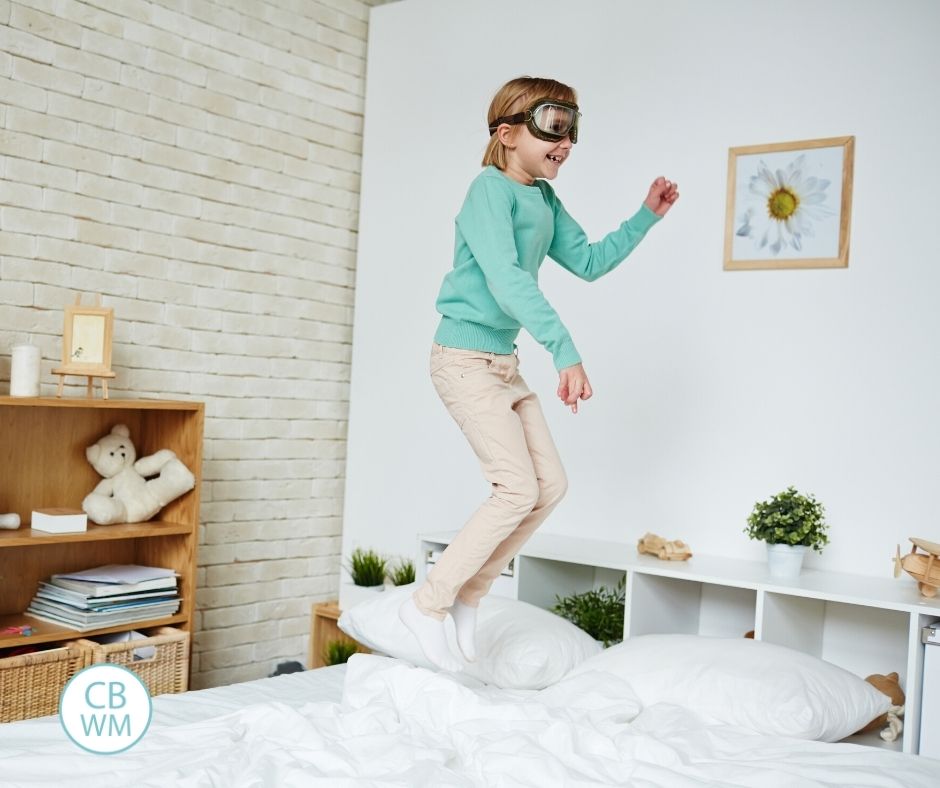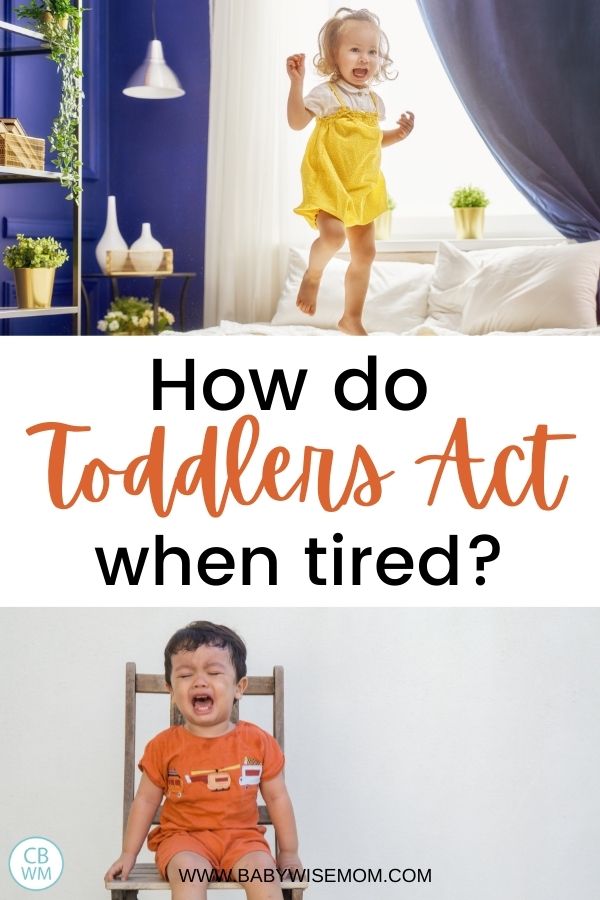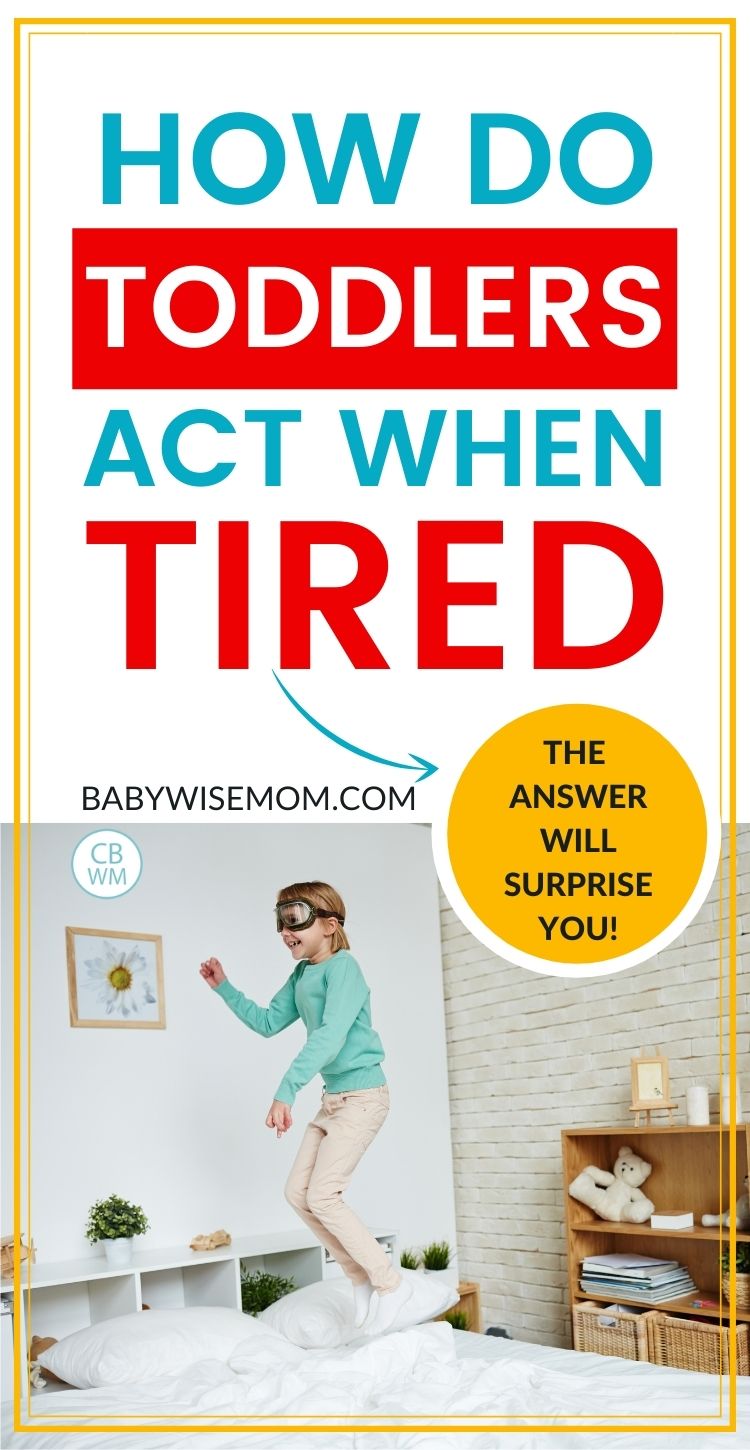Toddlers often get very hyper and active when they are tired. Parents assume the child is not tired, when they are actually overly tired.

In many ways, babies and children are miniature adults. It is not true, however, in all areas of life, and definitely not true when it comes to showing signs of sleepiness.
Think of yourself when you are tired. You yawn. Your eyelids droop. If you are like my husband you just fall asleep and start the head bob. You feel lethargic and unmotivated.
A great paradox of parenting is that a baby or young child does not do these things.
In Healthy Sleep Habits, Happy Child, Dr. Weissbluth states,
“…when most tired young kids get sleepy, they get grumpy and excitable” page 111.
He points out that well-rested children might yawn when tired, but chronically tired children will not.
His son called the state of tiredness “upcited” when he was three–a combination of upset and excited. Perfect right?
Dr. Weissbluth says, “Remember, when your infant or young child appears wired, he may be tired” (page 112).
Post Contents
Studies Explain Lack of Sleep
Dr. Weissbluth then goes on to discuss a couple of studies that shed light on this topic.
I will relate one to you in my own way. You know those times in life when you have had to run on less sleep than is optimal? Maybe college, maybe with a newborn, maybe when pregnant (if you are like me and don’t sleep well at night). Have you noticed how you eventually get used to running on less sleep? It doesn’t mean you are functioning at 100%, but you learn to function.
I find this true in my life. When I have a newborn and consistently get less sleep than is ideal, my body copes. When I have one bad night of sleep for whatever reason, I am slammed the next day.
The study found that the body responds to lack of sleep with various chemicals. One is adrenaline (the hormone epinephrine). Another is cortisol. “In children, cortisol concentrations remain high when they do not nap” (page113).
This increase in chemicals explains why an overly tired child has a hard time falling and/or staying asleep. The body is flooded with chemicals in order to help the overly tired child stay awake, so it makes it harder to sleep. Just as sleep begets sleep, sleeplessness begets sleeplessness.
What This Means for Toddlers
This means that your toddler, who is acting like he is perfectly awake and not tired, but is very hyper instead, is actually not getting enough sleep.
This explains why toddlers get hyper before bed. A tired toddler or an overtired toddler looks different than you might think.
You might be thinking that your child is not tired enough to go to bed even though it is bedtime because she is bouncing off the walls and seems very much awake. But in reality, this hyperactivity is showing signs of overtiredness.
Exhaustion in a toddler and exhaustion in an adult look very different.

Signs of Overtired Toddler
What are the tired signs to watch for?
We have discussed how one sign of being overly tired and sleep deprivation is being very hyper and overactive.
This, of course, is not the only sign. Sometimes kids are just hyper for a variety of reasons not related to how tired they are or are not.
There are other signs to watch for.
If your child has tantrum after tantrum, he may be overly tired. Unpleasant behaviors are typically a sign your kiddo needs more sleep.
If your kiddo has a lot of clinginess and fussiness, it is a sign he is too tired.
How To Help With Overtiredness
There are ways you can help your older child who is overly tired.
The first step is for you to figure how many hours of sleep your child should be getting in a 24-hour period at his age.
There is always a range for every age group. You want to be sure your child is getting the proper amount of sleep at nighttime and the proper amount of daytime sleep, also.
Get my sleep totals by age freebie by clicking here
Once you know how much sleep to aim for each day, you can focus on your routines.
What does your toddler need to wind down for sleep? How much awake time does your toddler or preschooler need?
Figure out a good sleep schedule for your child. A toddler needs 1-2 naps a day. A preschooler needs 1 nap a day. Some preschoolers do not need a nap each day, but rather need quiet time.
>>>Read: How To Do Rest Time Instead of Naps
Most toddlers and preschoolers do not ask for a nap. Most even insist they don’t need one at all. This is definitely a moment when the parent needs to take the lead.
All toddlers need a nap. They might not sleep every day, but the rest is still good. Find out the best length of time to do a nap.
All preschoolers need a rest. Some need naps.
Good sleep habits are important for baby sleep, but are also important for toddler sleep and preschooler sleep. Make sure you have an age-appropriate bedtime.
>>>Read: Preschoolers and Bedtime: Everything You Need to Know
Have consistent sleep routines, including a consistent bedtime routine. Read bedtime stories. Wind down for the night. Sing a lullaby. Use a white noise machine if needed.
Set things up so your child can get a good night’s sleep. You might need some room darkening curtains to help the room be dark at bedtime. Your kiddo might need a special blanket. Do not let your child sleep with a tablet.
>>>Read: One Nap Schedules Perfect for Your Toddler
Conclusion
A tired child does not look like a tired adult. You can’t wait around for your baby to ask you to put him to sleep or to peacefully drift off into a slumber.
Yes, some of those children are out there, but most need you to put them to bed for naps and for bedtime.
Also, let me give another plug for this book. It is a most excellent companion to On Becoming Babywise. People who try to discredit Babywise like to turn to “Gary Ezzo isn’t a doctor” when all else is failing (despite the fact that Robert Bucknam is a doctor).
Weissbluth is a doctor and stresses the importance of sleep. There are several books written by doctors that support Ezzos claim that sleep is important and support his ideas on how to get there (do we really need a doctor to convince us that sleep is important? Can’t we tell that from our own lives? Or maybe only well-rested adults can come to that conclusion on their own?).
Related Posts:
- Solve Sleep Problems for Toddlers and Preschoolers
- How To Fill Toddler’s Time When Transitioning to One Nap
- What To Do When Your Toddler/Child is Getting Out of Bed
- What To Do When Your Toddler Stops Napping Every Day
- How To Deal with the 2 Year Old Sleep Regression
- What to Do When Your Toddler Cries at Nap Time

This post originally appeared on this blog in October 2011
